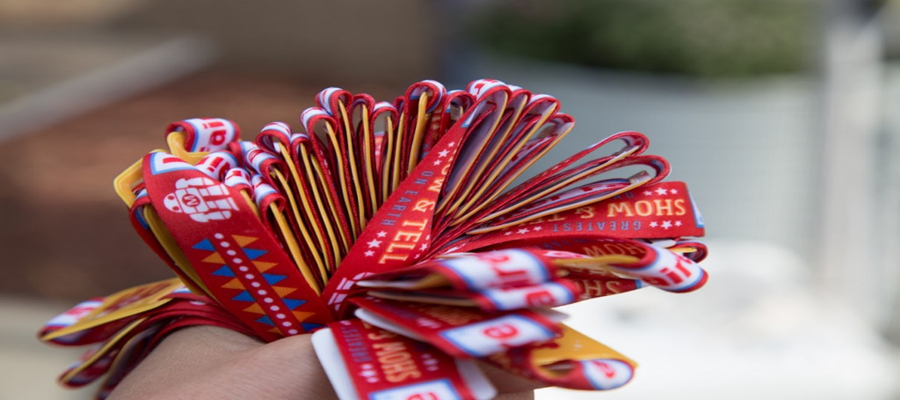For event organizers who haven’t yet implemented the technology or experienced it first-hand, Intellitix’s CEO and Head Pilot, Serge Grimaux, explores the top ten myths surrounding the use of RFID for festivals, and debunks them once and for all.
MYTH 6: RFID MAKES GUESTS SPEND MORE THAN THEY INTEND TO
Although the speed and convenience of Cashless Payments result in a higher lift in on-site revenue compared to cash or credit cards, registered guests receive email notifications of every transaction they’ve made and have the ability to view their transaction history online. This provides guests with complete transparency in their spending, allowing them to control their finances. What our Cashless Payment solution does really well is speed up bar and concession queues, giving customers what they want, when they want it. Also, any leftover funds on their account will be refunded post-event.
MYTH 7: RFID CLOSED-LOOP CASHLESS SYSTEMS DON’T REPORT IN REAL-TIME
A closed-loop system does not mean transactions are made in a non-server-connected environment. On the contrary, a closed-loop system operates on a secure, private network ‘closed’ off from the outside world, including public Internet, with all cashless POS terminal connected and synced to the local server located on the event site. This serves to be an advantage for event organizers as it ensures cashless payments can always be processed with 100% uptime free of network interruptions, while capturing all audience and purchasing data for real-time reporting capabilities.
MYTH 8: RFID CAN’T REALLY ENHANCE MY EVENT EXPERIENCE
From the event organizer’s point of view, by leveraging the real-time data captured from RFID technology, RFID for festivals, they can improve their event on the fly or enhance future event content and site planning. For instance, data on how many patrons are entering the event from a specific access area allows organizers to immediately allocate more staff to help speed up entry during peak traffic periods. Learning which products and vendors are the top-sellers ensures festival-goers will get to enjoy more of what they like without running low on inventory. Organizers, vendors and sponsors also have the opportunity to extend fan engagement post-event with exclusive content, offers and promotions based on their interests and RFID activities. Events are only scratching the surface with what they can do with the Big Data captured through RFID technology.
From the patron’s point of view, being able to transact on an event site without having to carry bank notes, credit cards, debit cards, or a smartphone, and to do this with a degree of efficiency never before achieved is one of the greatest changes made in live events. The technology platform is convenient, secure and smart. It brings the holistic event experience to a whole other level.
MYTH 9: RFID IS TOO EXPENSIVE TO DEPLOY
The benefits of RFID solutions significantly outweigh the cost to implement the technology, and in many ways can help save costs for the event organizer and increase revenue opportunities. Our closed-loop Cashless Paymentsystem has proven to increase on-site guest spending by up to 15-30% compared to traditional methods of payment due to the speed of the transaction and advanced Top-Ups, among many other reasons. Real-time digital reporting eliminates the need to count or weigh physical tokens, while significantly reducing staffing and security costs for cash handling processes. Brand Amplification initiatives also boost sponsorship opportunities by delivering analytics-based insight and ROI to brand partners. In fact, our business model is a reflection of this reality: we only make money if the event organizer generates more income than they would have without the use of our solutions.
MYTH 10: RFID ISN’T GOING TO LAST ANYWAY
There is no doubt that RFID is reshaping the live event landscape and the rise of Cashless Payment technology shows no signs of slowing down, as consumers all over the world have grown to trust and understand the technology. Despite development in NFC mobile payments, there are limitations to using smartphones in current-day festival environments such as lack of signal, battery drainage, lack of charging stations, lost or stolen phones, and compatibility issues with different phone platforms. In contrast, RFID technology has been used in various industries for almost 50 years and the use of RFID wristbands are accessible to all patrons.
CONCLUSION
The core of our philosophy is that the Intellitix platform should improve the experience at events for the organizer and their audience, bridging digital technology with real life experiences. So rest assured these myths are exactly that – myths that need to be put to bed. The myriad of benefits to organizers, vendors and consumers are simply too great to ignore. Faster service, increased revenues, improved security, eradication of theft and fraud, and unparalleled audience insight.
Humans are resistant to change unless they experience the benefits of what is new first hand. Not a single event that has started to use RFID technology for Access Control has gone back to reading barcodes. If some events have witnessed poor cashless deployments in the past, it is simply because they forgot to ask themselves the most fundamental question in the decision-making process: whom am I dealing with and what events has this supplier worked with before? If suppliers are offering unbelievable prices and incredibly favourable conditions, it is likely the quality of the technology and deployment will be compromised, as not all suppliers have the experience to know what they are doing or how to solve challenges as they arise. If something is too good to be true, then it shouldn’t be trusted!
Be correctly informed and you’ll be happier with the decision you’ve made; plus, you’ll wonder why you haven’t adopted RFID solutions sooner. And this is not a myth!






